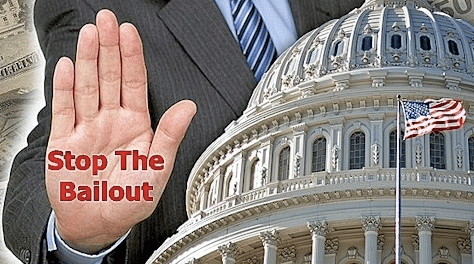That adroit member of the British Parliament Enoch Powell once said that “the supreme function of statesmanship is to provide against preventable evils.” This duty, incumbent upon politicians endowed with wisdom, is made difficult because “by the very order of things such evils are not demonstrable until they have occurred.”
Well, the market crash has finally occurred, and laid bare the “evils” of America’s monetary policy. This month saw the worst stock market crash in nearly forty years. The next month will see hundreds of thousands, if not millions, marching into unemployment. Whole industries find themselves on the brink of bankruptcy.
Those in power, and their court economists, will scapegoat all problems on the coronavirus pandemic. But the virus, the incidental trigger of the market panic, must not be confused with the cause of the economic bust: a broken banking system.
In healthy economic growth, businessmen borrow the savings of others—the size and existence of which is indicated by an accurate interest rate—and use it to invest in capital goods and workers. Production increases, and the standard of living rises.
But in our septic central banking system, real savings are substituted by cheap credit that only exists on a banker’s balance sheet. Dials are twisted as the Federal Reserve system manipulates the rate of interest, causing distortions as businessmen are given false signals. This easy money, confused for real loanable funds, is borrowed and put into malinvestments that distort the structure of the economy.
The story is the same whether you’re describing 1929, 2008, or 2020. The market inevitably hits its tipping point as businessmen realize that the money they’re playing with is nothing but smoke and mirrors. The bubble bursts, and the boom, toxic from the beginning, busts.
And now that the good times are over, and the promise of false prosperity has crumbled in their hands, politicians have lined up to bail out big business in the most repulsive form of corporate welfare our system has to offer. The airline industry requested fifty billion dollars from the federal government, more than triple what they received in assistance after the September 11 attacks. Boeing, that behemoth of defense contractors, asked for sixty billion all for itself. Then comes the cruise lines, the hotels, and half a dozen other interests ready to get a handout from a half trillion-dollar slush fund.
The right response, both ethically and economically, would be to let them fail. It’s not right for Main Street to bail out Wall Street, allowing insolvent corporations to feed like vampires on the people’s tax money collected by their crony politicians. And saving them is the start of the same process that created our economic catastrophe in the first place.
The harm bailouts cause goes beyond first impressions. Yes, hundreds of billions of dollars are wasted, as our ominous national debt creaks and groans under its own weight. But it’s the secondary effects that produce the real rot.
Capitalism is about profit and loss. Businesses succeed or fail on their ability to serve the demands of consumers at the cheapest price. But when you have a policy of “too big to fail,” where you bailout inadequate firms and their managers, you destroy both business incentives and the market’s self-regulating mechanism. Bailouts are a function of state capitalism and corrupt corporatist structures.
And what would happen if the airline industry was allowed to go bankrupt? Their planes wouldn’t be melted down for scrap. The capital structure wouldn’t disappear. Instead, it would be sold off to younger, more capable entrepreneurs who would be more adept at serving the public. Free markets encourage dynamic and creative change, while bailouts and cronyism only encourage the preservation of dinosaurs and legacy brands.
This sort of clearing house ought to take place in every sector of industry. Malinvestments must be allowed to liquidate and free up wasted capital, instead of being kept on life support, a continuous drain on the economy. President Ronald Reagan and Federal Reserve Chairman Paul Volcker understood the wisdom of necessary, short-term pain in exchange for a return to long-term health. The recession of the early 1980s was deep, short, and politically damaging. But the result was real growth, not another series of cheap credit bubbles.
Our leaders today don’t have the wisdom of Enoch Powell to prevent disaster, or the intrepidness of Reagan and Volcker to see the disaster through once it occurs. Instead, they make blanket promises that a state intervention will fix all that ails you, as if the piper never has to be paid. Donald Trump and senate Republicans could have done the right thing: refuse the bailouts, allow a much-needed market correction, and take the electoral results on the chin in November.
They didn’t though. Instead they’ll hand billions of dollars to the big businesses that bankroll their campaigns, while simultaneously sinking trillions more in harebrained stimulus packages. That’s because we’re not ruled by statesmen. No, instead we’re overseen by men like Senator Richard Burr, scoundrels who enrich themselves off the public purse while the national interest be damned.
Men like that, Powell said, who create and perpetuate these preventable evils, “deserve, and not infrequently receive, the curses of those who come after.”








